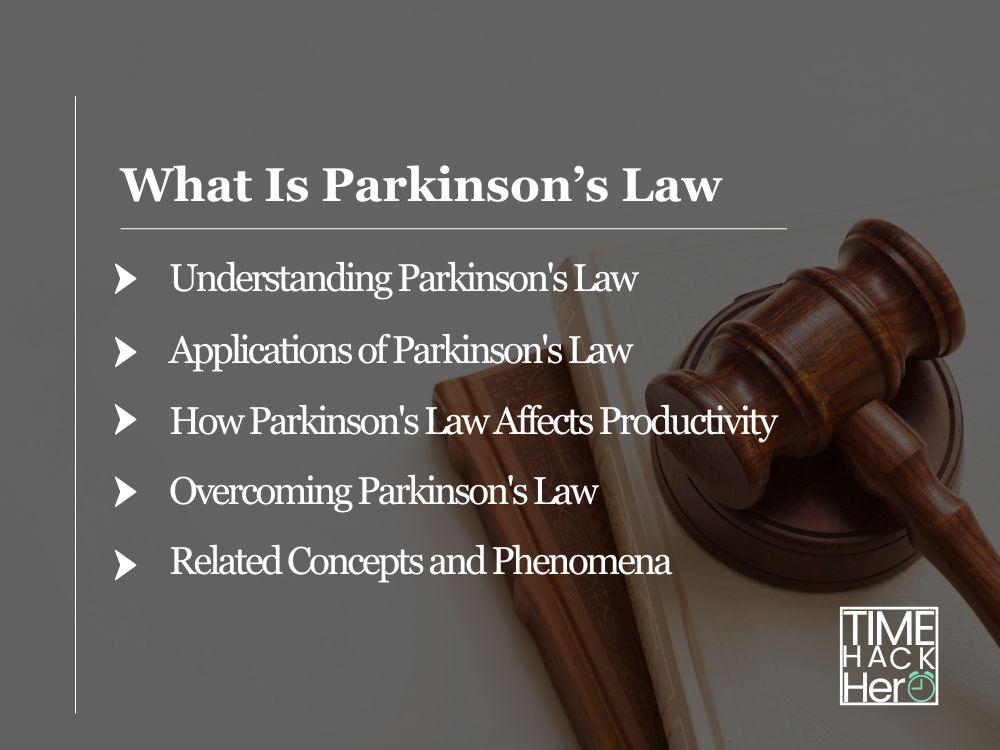Parkinson’s Law is a principle that highlights human inefficiency when more time is given than necessary to accomplish a task. Originally formulated by Cyril Northcote Parkinson, the law states that “work expands so as to fill the time available for its completion.” This concept sheds light on our innate propensity to procrastinate or become overwhelmed by tasks when provided with excessive time to complete them.
The concept of Parkinson’s Law extends beyond time management and has been observed in various aspects of life, such as public administration and bureaucracy. It is believed that organizations tend to expand, regardless of their workload, as individuals create more work for themselves and others. By exploring this phenomenon, we can better understand the importance of setting realistic deadlines, prioritizing tasks, and maintaining optimal efficiency in both professional and personal pursuits.
To counter the effects of Parkinson’s Law, it is essential to recognize the relationship between time allotment and productivity. By imposing strict deadlines, breaking projects into smaller tasks, or putting tasks into the context of larger goals, individuals can develop strategies to more effectively manage their time. This, in turn, can lead to more focused work, increased efficiency, and overall, an enhanced ability to complete tasks successfully and in a timely manner.
Table of Contents
Understanding Parkinson’s Law
Cyril Northcote Parkinson
Cyril Northcote Parkinson was a British historian and author who first introduced the concept of Parkinson’s Law. He was a naval historian who observed the expansion of bureaucracy within organizations and public administration. Parkinson’s Law is based on his observations and was first published as an essay in The Economist in 1955.
Origin and Intentions
Parkinson’s Law is an axiom that states, “Work expands so as to fill the time available for its completion.” In other words, tasks become harder to complete when more time is given to complete them, as the build-up to the task becomes stressful and daunting. The adage was named for Cyril Northcote Parkinson, who first described the phenomenon in his essay. The primary intention of Parkinson’s Law is to highlight the inefficiencies and time-wasting tendencies within organizations.
The Postcard and the Formula
A key element of Parkinson’s Law is the idea that given more time to complete a task, people will procrastinate or fill their time with trivial matters, ultimately making the task more difficult than it needs to be. One example of this can be seen in the comparison between writing a postcard and a lengthy report:
- Writing a Postcard: A simple and short communication that can be easily completed in a short amount of time without the need for additional effort or complications.
- Creating a Lengthy Report: A more involved task that requires a significant amount of time to complete. As more time is allocated for its completion, the report may become increasingly complex, potentially leading to an increase in procrastination and unnecessary additions to the task.
To better understand Parkinson’s Law, consider the following formula:
Work (Complexity) = Time Available (Length)
As the time available for a task increases, so too does the complexity of the task, leading to inefficiencies and difficulties in completing it.
In summary, understanding Parkinson’s Law helps individuals and organizations identify inefficiencies and work towards improving productivity. By exploring its components, such as the origins, intentions, and the relationship between time and work complexity, one can identify strategies for overcoming procrastination and effectively managing time.
Applications of Parkinson’s Law
Parkinson’s Law states that work expands to fill the time available for its completion. This principle can have significant impacts across various fields and can be applied to improve efficiency and productivity. In this section, we will discuss the applications of Parkinson’s Law in project management, time management, decision-making, organization, and bureaucracy.
Project Management
In project management, Parkinson’s Law highlights the importance of setting clear deadlines and avoiding unnecessarily long timelines. By establishing shorter, realistic deadlines, managers can help team members to focus on completing tasks efficiently:
- Break large projects into smaller tasks with specific deadlines
- Monitor progress regularly and adjust timelines as needed
- Encourage team members to communicate any issues or obstacles in meeting deadlines
Time Management
Parkinson’s Law can be utilized to overcome procrastination and other time-management problems. Applying the principles of Parkinson’s Law to time management:
- Allocate specific durations for individual tasks
- Create a sense of urgency with shorter time frames
- Avoid overestimating the time needed to complete tasks
Decision-Making
In decision-making, understanding Parkinson’s Law can help individuals and organizations speed up their processes and avoid being bogged down by indecision:
- Set time limits for research, discussion, and decision-making processes
- Break complex decisions into simpler components with individual timelines
- Use scheduled deadlines to prompt decisive action, even in uncertain circumstances
Organization
In the context of organization, Parkinson’s Law can guide individuals or teams to be more efficient and structured in their work:
- Organize tasks based on priority, with deadlines set to reflect their importance
- Utilize calendar and scheduling tools to manage and track deadlines
- Ensure that processes for delegating responsibilities are clear and followed
Bureaucracy
Parkinson’s Law also applies to public administration and bureaucracy, suggesting that over time, such systems often require greater resources and effort without necessarily having increased workload:
- Streamline processes to reduce unnecessary layers of administration
- Implement performance metrics to monitor and improve efficiency
- Encourage collaboration and communication between departments to reduce redundancy+
How Parkinson’s Law Affects Productivity
Work Expands to Fill Time Available
Parkinson’s Law states that “Work expands so as to fill the time available for its completion.” This phenomenon can negatively affect productivity as it implies that people tend to take longer than necessary to complete tasks when given ample time. Although the additional time may seem like an advantage, it can lead to inefficiency in the use of resources.
- Completion: Tasks that could be finished earlier might drag on unnecessarily.
- Time available: A longer deadline might not always benefit the completion of a task.
Procrastination and Deadlines
Parkinson’s Law can contribute to procrastination, as people may delay starting on a task, knowing they have plenty of time to complete it. This can result in work being rushed just before the deadline, leading to decreased quality of outputs.
- Task: Procrastination can lead to subpar work and increased stress.
- Deadlines: Setting realistic deadlines can help mitigate procrastination.
Inefficiency and Goals
When Parkinson’s Law is in play, the expanded time to complete tasks can lead to inefficiency, as individuals may spend unnecessary time on trivial matters, and not prioritize their goals effectively.
- Inefficiency: Time and resources may be wasted on non-essential tasks.
- Goals: Proper prioritization can help combat Parkinson’s Law and improve productivity.
By being aware of the implications of Parkinson’s Law on productivity, individuals can work towards setting better deadlines, prioritizing tasks, and managing their time more effectively. This can result in higher efficiency and better quality of work outcomes.
Overcoming Parkinson’s Law
Prioritization and Goal Setting
One of the ways to overcome Parkinson’s Law is by focusing on prioritization and goal setting. By identifying your mission and vision, you can allocate resources effectively and avoid stretching tasks unnecessarily. Break down complex projects into smaller tasks, and assign a priority to each task based on its importance. Utilize a matrix for prioritization such as:
| Priority | Task |
|---|---|
| 1 | Design |
| 2 | Development |
| 3 | Testing |
Setting goals helps to reduce stress and wasted time by providing team members with direction and a sense of accomplishment upon completion.
Effective Communication
Effective communication is essential in overcoming Parkinson’s Law. Keep the communication channels open within a team and update everyone regularly on project progress and changes. Sharing regular status updates reduces the scope for wasted time and keeps team members informed about each other’s work. Remember to consider these key aspects:
- Timely communication to avoid misunderstandings
- Clarity in your message to prevent confusion
- Active listening to understand team concerns
Self-Imposed Deadlines
Self-imposed deadlines or personal deadlines can help combat Parkinson’s Law by incentivizing individuals to complete tasks within a specific time frame. A timer can be used to set personal deadlines, allowing employees to stay on track and finish their work on time. For example, if you have a 3-hour task, set a timer for 2 hours and 30 minutes to challenge yourself to finish it sooner. By self-imposing deadlines, you maintain a balance between the task complexity and allocated time, ultimately leading to better productivity and reduced stress.
Related Concepts and Phenomena
Law of Triviality
The Parkinson’s Law of Triviality, also known as the Law of Triviality or the bike-shed effect, emphasizes that organizations often spend a disproportionate amount of time and energy on trivial issues while neglecting significant ones. This phenomenon was observed within the British civil service and described in a satirical essay.
Hofstadter’s Law
Hofstadter’s Law states that any task will always take longer than expected, even when taking into account Hofstadter’s Law. It highlights the complexity and unpredictability of tasks, making it difficult to correctly estimate the time to completion.
Peter Principle
The Peter Principle is an observation about the tendency of employees to be promoted based on their current performance until they reach a level where they are no longer competent. This results in a situation where roles in an organization are often filled by individuals who are not fully capable of fulfilling their responsibilities.
Jevons Paradox
Jevons Paradox occurs when technological progress increases the efficiency of resource use, but the rate of consumption of that resource rises due to increased demand, negating any gains in efficiency. The paradox illustrates that improvements are not always as beneficial as they may initially seem.
Snackwell Effect
The Snackwell Effect describes a situation where people consume more of a product because they perceive it as healthier or safer, ultimately leading to overconsumption and potentially negating any health benefits. This can be observed in the consumption of low-fat, low-sugar, or other “healthy” foods.
Student Syndrome
Student Syndrome is the tendency to procrastinate on tasks with a long deadline, leading to increased stress and reduced productivity as the deadline approaches. This phenomenon is often observed among students, who may delay starting assignments until the last minute. The Pomodoro Technique is a popular time-management method used to combat this syndrome by breaking work into shorter, focused intervals.
Sydney Opera House Case Study
The Sydney Opera House construction is a classic case study illustrating Parkinson’s Law, Hofstadter’s Law, and the eponymous laws’ impact on project management. The project’s initial estimate for completion was six years; however, it took 14 years and significantly exceeded the initial budget. This example highlights the challenges in accurately predicting project timelines and the potential consequences of underestimating factors such as scope, complexity, and uncertainties.









